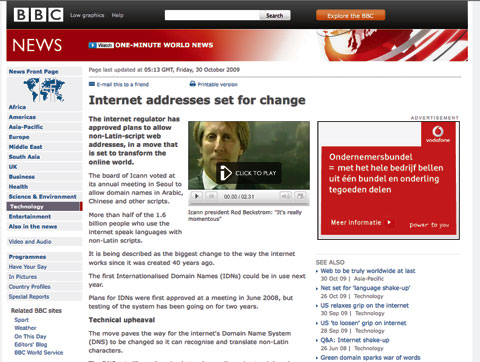Until now the internet could not handle Chinese or Arabic web addresses. But by next year the first internationalized domain names (iDNs) could be in use.
The BBC news site reports that the board of Icann (Internet Corporation for Names and Numbers) has approved plans to allow the use of non-Latin-script in web addresses. Icann took this decision last week at its annual meeting in Seoul, South Korea. It is being described as the biggest change to the way the internet works since it was created forty years ago, the BBC wrote.
Prof.dr. Henk Sips (Electrical Engineering, Mathematics and Computer
Science) says this is a logical change. “We used to have an 8-bit character set that only had room for 256 characters, but that wasn’t enough even to contain all French characters. That set has however been replaced by the 16-bit Unicode system that offers more than enough room for Chinese, Korean and Arabic characters. On my computer I can easily find the whole bunch.”
Sips points out that almost all software already uses Unicode. Windows installed in Korea for example uses Korean characters. The difference is that until now the web addresses listed in the internet’s Domain Name System (DNS) phonebook had to be in Latin script. This new development is of significance especially for Chinese, Arabic, Russian and Korean people who do not read or write English; they will now be able to use the internet in their own languages, once the new system is operational. “In principle it’s simple”, Sips says. “But it’s like the Y2K millennium problem. You never know how deep the use of a set of characters is embedded in the system.” Plans for international domain names were first approved in 2008, but testing has been going on for two years.
TU Delft PhD student, Yuguang Yang, from Shanghai, can’t wait till Unicode is up and running. “Internet exists for such a long time already. And all those years it was restricted only to Roman characters. I started to wonder if it was impossible to add other characters”, says the researcher at the faculty of Civil Engineering & Geosciences.
Yang thinks the improvement of the internet will enable him to communicate by email with many more relatives, like his grandmother for instance. “At the moment she doesn’t use email because she isn’t used to the English alphabet”, he says, while adding that iDNs internationalization will also put an end to many of odd email addresses that Chinese people currently use. “In the Chinese language, names that are pronounced similarly can be written in many different ways. But in English all the names are written the same way, so in order to create a new email address you therefore have to add numbers or other characters to your name”, says Yang, who has more than a dozen namesakes employed at TU Delft alone, not to mention all the BSc and MSc students who are also named Yang.
Iranian students and academic in the Netherlands are bringing a lawsuit against the Dutch government. The lawsuit aims to force the government to remove a regulation that excludes Iranian researchers from studying nuclear-related programs in the Netherlands. Behnam Taebi, an instructor in TU Delft’s philosophy section (TPM), is a member of the Iranian Students Action Committee that is bring the lawsuit. “Since the Dutch government refuses to remove the regulation, we must take legal action”, Taebi says.



Comments are closed.